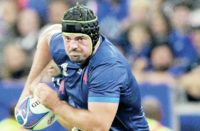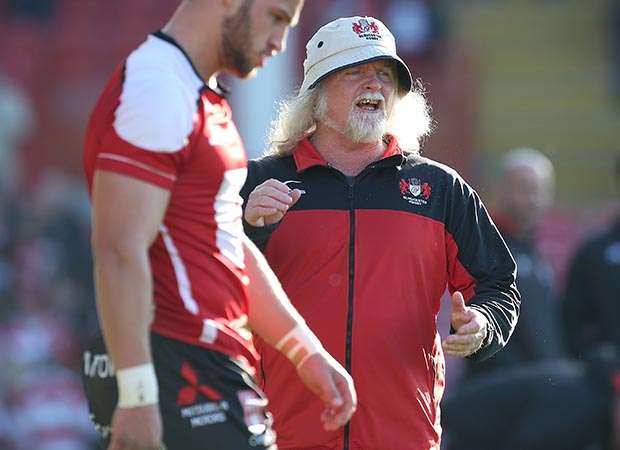 If opensides like Australia's David Pocock and Michael Hooper, and the recently retired double New Zealand world champion, Richie McCaw, proved at the 2015 World Cup that they are the kings of the game, then men like Laurie Fisher are the king-makers.
If opensides like Australia's David Pocock and Michael Hooper, and the recently retired double New Zealand world champion, Richie McCaw, proved at the 2015 World Cup that they are the kings of the game, then men like Laurie Fisher are the king-makers.
Gloucester head coach Fisher stands out not just because he is rarely seen without the sun hat that was his trademark at the Brumbies before he arrived at Kingsholm 18 months ago. While it might be the most superfluous bit of kit to be had in the depths of a West Country winter, for the rugby folk of Gloucester, and their rising No.7 Matt Kvesic, Fisher is a coach to be treasured.
The combativeness Fisher helped to instil in the Canberra-based Brumbies saw them win two Super Rugby titles on his watch, as well as being runners-up three times, and there are signs that Gloucester's edge is also hardening.
A priceless component in this is the Aussie's expert knowledge of the breakdown, and the specialist role of the openside within it.
Anyone requiring evidence has only to watch a replay of Kvesic's role in securing Gloucester a draw in last weekend's Big Game against a resurgent Harlequins side in front of a 70,000 plus crowd at Twickenham.
In a classic cut-and-thrust contest Kvesic earned his man-of-the-match award by winning a series of match changing turn-overs. However, if they were the gold bullion, the Gloucester openside's non-stop tackling and linking also had the hallmarks of Test match currency as he outshone a Quins back-row featuring another England No.7 hopeful, Jack Clifford, and England's captain since 2012, Chris Robshaw, who was operating at blindside.
We should not be surprised at the strides that Kvesic, below, has made, because Fisher has previous history when it comes to burnishing openside talent.
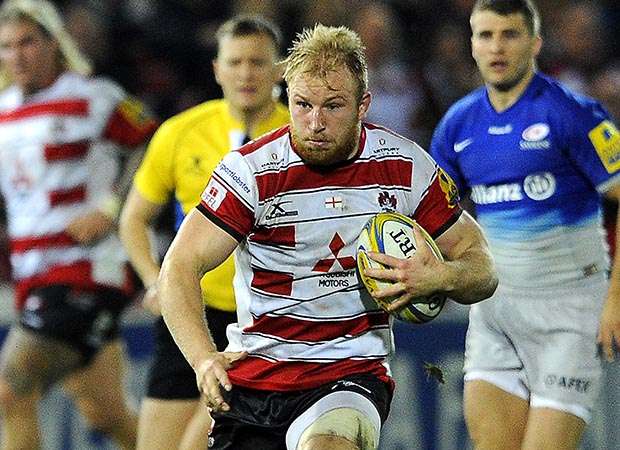 As Brumbies head coach for five seasons, and before that academy coach for four, he was responsible for bringing through a galaxy of 7s. He had a big hand in the development of George Smith, the 111-cap Wallaby who, at 35, has been an intrinsic part in Wasps early season European surge, and later worked his magic with Pocock and Hooper, while Julian Salvi, now with Exeter after regularly being top of the Premiership turn-over charts with Leicester, was another of his proteges.
As Brumbies head coach for five seasons, and before that academy coach for four, he was responsible for bringing through a galaxy of 7s. He had a big hand in the development of George Smith, the 111-cap Wallaby who, at 35, has been an intrinsic part in Wasps early season European surge, and later worked his magic with Pocock and Hooper, while Julian Salvi, now with Exeter after regularly being top of the Premiership turn-over charts with Leicester, was another of his proteges.
It is a measure of Fisher's standing in his homeland that when his move to Gloucester was announced the Sydney Morning Herald ran a piece suggesting that his departure could be more costly for Australian rugby than the player drain to European clubs.
Ask Fisher whether he is surprised that for the last decade English coaches have ignored the legacy of great opensides like Neil Back and Peter Winterbottom in favour of big bangers in all three backrow positions and, although he is diplomatic, he makes it clear it was a wrong turn.
“I know there is always a place for someone who can play hard on the ball to stifle or turn-over opposition possession. There's been a push in recent years for more guys, such as centres and front-rowers to do it, but it is still the 7s who have a special aptitude for the job.”
Fisher says that there are good reasons why Australian coaches have never lost that belief in 7 as a key specialist position.
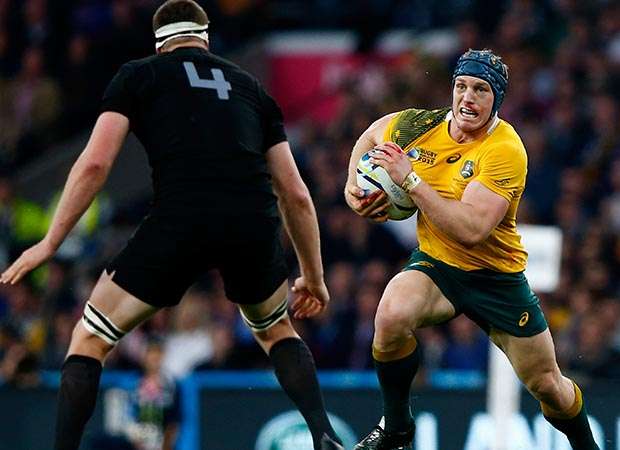 “Australia have struggled to compete traditionally with the size and power of some international teams, so our game has been more about speed and skill, and making it count. That's why we say, ‘let's be in first, in best, in strongest'. Having an effective openside is so valuable in being able to compete by not only winning quick possession for your own team, but also stopping the other side's flow.”
“Australia have struggled to compete traditionally with the size and power of some international teams, so our game has been more about speed and skill, and making it count. That's why we say, ‘let's be in first, in best, in strongest'. Having an effective openside is so valuable in being able to compete by not only winning quick possession for your own team, but also stopping the other side's flow.”
There is no hedging either from Fisher when questioned whether a 6ft 5ins openside can be as effective over the ball as a much shorter Pocock, above, or McCaw: “No. It's much more difficult for bigger guys because they do not have the speed of movement or the balance to work at ground level as effectively. Where Pocock and others have the advantage is that they strike better and faster than their opponents.
“To strike in a small window of opportunity is the bailiwick of the smaller more nimble man.”
He adds: “It is also very important for the 7 to have a handling game. Matt Kvesic has very nice footwork, with good lateral movement, whereas George Smith has a lovely pass and such good hands.”
When asked what he makes of England's openside stocks, Fisher broadens the search first. “There are a lot of good players around – in fact, in any position from one to 15 there are plenty of options available. However, at international level you want people who are absolutely exceptional – world-class. There are so many good players here, but you'd like to think there are those four or five great players you can build a great team around. But how many great players are there? How many will you get who can win a World Cup?”
Fisher says that Kvesic has what it takes to be one of those world-class players: “He has really good instincts, and the physical attributes required. He's also got the ambition, and he's prepared to do the work. He has the work ethic – and he's a player who when he moves from a club to international environment has the capacity to get better and better.”
He adds: “Invariably, the best players are the hardest workers, and they are also the most critical about their strengths and weaknesses – and work hardest on them. That's where Matt is: He has a great appetite for hard work, but you have to make sure it is unquenchable.”
However, we get an insight into how high Fisher sets the bar in an assessment of Kvesic that is rigorous rather than starry-eyed. “We're making good progress. We have had to focus on Matt being harder to shift – which we work on every week – and also making the right decisions to come in or stay out.”
He continues: “We get him to chase the game, especially from inside the ball – and if he's on the tackled player straight away then he has a 100 per cent licence to go for it. If he is one out from the tackle then it's a judgement call whether he goes in or stays out.”
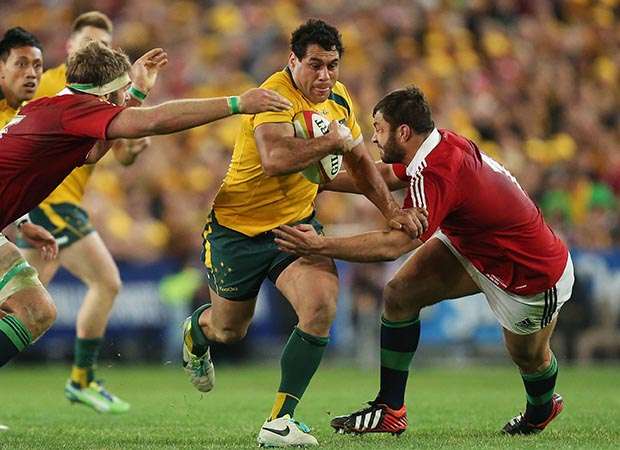 Fisher explains: “He has to fulfil his team role in defence first, and then be an opportunist. That's about an ability to read the game – and that's where George Smith, above, is exceptional. His natural decision-making is superb. Richie McCaw succeeded more by banging his body through rucks and it was his remarkable physicality and fight that put him apart, whereas George's style is more selective, about when to go in, and when not.”
Fisher explains: “He has to fulfil his team role in defence first, and then be an opportunist. That's about an ability to read the game – and that's where George Smith, above, is exceptional. His natural decision-making is superb. Richie McCaw succeeded more by banging his body through rucks and it was his remarkable physicality and fight that put him apart, whereas George's style is more selective, about when to go in, and when not.”
Ask him how Kvesic compares with Smith, Pocock and Hooper and he says: “He's not at their level at this point, but he is moving in the right direction. Matt has to work on acceleration into the breakdown, as well as being alive to being in the game all the time. In the past he's had a tendency to pop in and out of the game, but now he's much more of an 80 minute man. That's a question of always being eyes up, and making decisions. The real challenge for Matt, and any openside at that level, is that there is no drop off in their intensity.”
Irrespective of that homework, Fisher's view is that England missed a trick by not resting Robshaw to give a specialist like Kvesic a chance in the World Cup warm-up games.
“You would have thought that to have a specialist openside during the tournament was very important, and that not to have that in your squad gives you less options.
“Chris Robshaw is a really good footballer but I certainly wouldn't consider him to be an openside in the same way as Wallaby 7s like George Smith, David Pocock, Michael Hooper, below, Liam Gill or Matt Hodgson. Robshaw is a good strong-running back-rower, sure, but in my mind he is not an openside in the Australian mould.”
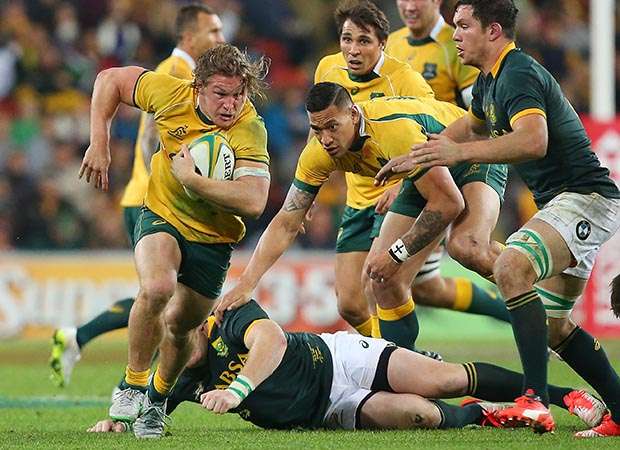 Fisher believes that Eddie Jones will be looking for 7s with that Aussie stamp when the England head coach picks his EPS contingent on January 13. “My guess is that he will certainly be looking for two specialist opensides in his top squad of 30 to 35 players. Having two will mean there is competition for the shirt, and they will have to be hard on the ball, and capable of turning a game.”
Fisher believes that Eddie Jones will be looking for 7s with that Aussie stamp when the England head coach picks his EPS contingent on January 13. “My guess is that he will certainly be looking for two specialist opensides in his top squad of 30 to 35 players. Having two will mean there is competition for the shirt, and they will have to be hard on the ball, and capable of turning a game.”
Fisher highlights just how important hard graft is with a Brumbies anecdote. “David Pocock would always be the guy doing things before and after training, like working on one-handed offloads, and he always seemed to have two or three balls at separate stations to practice different drills.
“Whereas others just do the basics when they come to training, the great players are the ones who also work hardest to hone their skills.”
He follows this by giving an insight into the breakdown instruction that has helped Pocock and company to become so formidable, and is now helping Kvesic.
“You have to be able to survive the clean-out to turn the ball over. To do that you need the flexibility to ensure that you give the opposition no front leverage point, so that they can get under your head and chest.
“It's not just about strength, it's about flexibility and being able to sense where the hit is coming from, and changing your foot and body positions. It is as much about balance, and being able to make adjustments, as it is about power. You get rewarded for good body position by referees at the moment, although my understanding is that in future they will want you to be trying to win the ball.”
Whatever the requirement, England will be well-placed to take advantage with the Fisher of 7s plying his coaching trade at Gloucester, and Kvesic as a main beneficiary.


